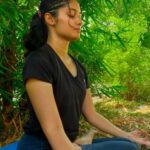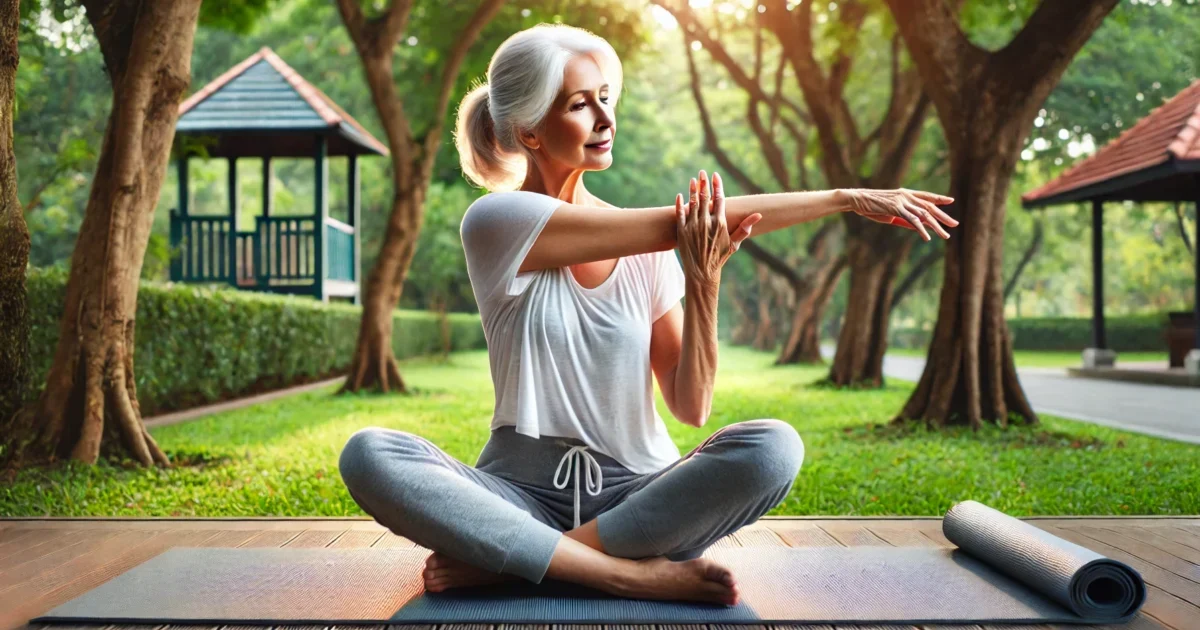Key Takeaway
Discover the best gentle yoga poses that ease arthritis pain and improve mobility for seniors.
Yoga is a mild exercise that can be customized for anyone with arthritis. Because yoga is gentle and adaptable to all levels of ability, it’s a fantastic exercise for people with arthritis. Deep breathing and steady, purposeful movements are the main components of the exercise, which can help with flexibility and stiffness reduction. People can also practice yoga at their speed because many poses can be modified to suit varying pain and mobility thresholds.
Practicing yoga regularly can help improve joint health by boosting circulation and lowering inflammation. Yoga’s emphasis on awareness and relaxation can help reduce stress, which frequently aggravates pain and suffering.
People with arthritis must begin with beginner classes or work with a trained instructor who is aware of the needs and limitations of people with joint problems. Poses can be modified by utilizing props like chairs, straps, and blocks.
All things considered, yoga provides a comprehensive method of treating arthritic symptoms by fusing mental health with physical activity, which can result in increased mobility and a higher quality of life.
See Also: The 9 Best Types of Yoga for Seniors
Contents
Why Yoga is Good for Seniors with Arthritis
Practicing yoga is good for seniors with arthritis for multiple reasons.
- It makes you more flexible
- Reduces joint pain and stiffness
- Helps you balance better
- Lowers stress and makes you happier
- Makes you feel better overall
Plus, it’s fun! You get to meet new friends. It’s great to see everyone chatting and laughing before starting class.
Getting Started: Tips for Your First Yoga Class
Before beginning yoga, keep the following advice in mind:
1. Consult your physician first. Before beginning any new workout regimen, it’s crucial to get checked, particularly if you have arthritis.
2. Locate a qualified instructor. Seek out a professional who has experience working with the elderly and those who have arthritis.
3. Begin with a chair or beginner yoga. Difficult positions don’t have to be done immediately. Go slowly!
4. Pay attention to your physical needs. Don’t do something if it doesn’t seem right. It’s not a competition!
5. Bring equipment for yoga. You may perform poses more readily if you have a yoga mat, blocks, and straps.
7 Best Yoga for Seniors with Arthritis
1. Seated Mountain Pose
Sit with your hands on your thighs, feet flat on the ground, and a tall spine. As you take a breath, extend both arms upward, palms facing one another, and aim for the sky. Maintain a loose shoulder stance and an open chest. Breathe out, then slowly lower your arms back to your sides. Concentrating on the length and stretch in your arms and spine, repeat for five to eight breath cycles.
2. Chair Cat-Cow Stretch
This is a fantastic method for back warmth. Place your hands on your knees and take a seat at the edge of your chair. Arch your back and raise your gaze as you inhale (Cow). Exhale, round your back, and bring your chin down toward your chest (Cat).
3. Seated Twist
Twists are excellent for your digestion and back. With your feet flat on the ground, take a sideways seat in your chair. Place your left hand on your right knee and your right hand on the chair’s back. Stretch a little further with your breath as you make a little twist to the right.
4. Warrior Pose (Modified)
This pose enhances balance and develops strength. Grasp the back of your chair for stability as you stand behind it. Make a lunge, step forward with your right foot, and bend your right knee. Maintain a straight left leg behind you. Make sure your right knee is aligned over your ankle and plant your heel on the ground. Keep your shoulders loose and your chest up. Take five deep breaths and hold. Repeat while switching sides and moving your left foot forward.
5. Tree Pose (with Chair Support)
With arthritis, balance postures might be challenging, but they’re crucial. Holding onto your chair for support, stand behind it. First, shift weight into the left foot, then place the right foot on the left leg. Don’t place your right foot on your knee; instead, place it on your left ankle or calf and shift your weight to your left foot. Try lifting your arms if you are stable.
6. Seated Forward Bend
This is an excellent way to stretch your back. With your feet flat on the ground, take a seat at the edge of the chair. Take a breath and stretch your back. With a gradual, forward motion, bend at the hips and extend your hands towards the floor or your feet as you release the breath. Let your head and neck hang heavy while you relax. Feel the stretch in your hamstrings and back as you hold the pose for five breaths. Then, slowly raise yourself back up on an inhale.
7. Legs-Up-the-Wall Pose (or Chair)
This is a great way to wrap up your yoga routine. You can either sit in your chair and prop your legs on another chair, or you can lie on the floor with your legs up the wall. Shut your eyes and concentrate on your respiration.
Chair Yoga: A Great Option for Seniors with Limited Mobility
When I first started teaching chair yoga, I wasn’t sure about it. How much could you really do sitting in a chair? Turns out, a lot! Chair yoga has been amazing for seniors who can’t move around much.
Here’s a simple chair yoga routine that you can follow:
1. Seated Mountain Pose (for good posture and breathing)
2. Chair Cat-Cow (for a flexible spine)
3. Seated Twist (for spine rotation and digestion)
4. Arm Raises (for shoulder movement)
5. Seated Forward Bend (for stretching and relaxation)
6. Ankle and Wrist Rotations (for joint movement)
7. Seated Relaxation (for calm and stress relief)
Remember, move slowly, and pay attention to how you feel. It’s not about how far you can stretch, but how aware you can be in each pose.
The Science Behind Yoga for Arthritis
The Johns Hopkins Arthritis Center has done some great studies on this, providing valuable insights into the mechanisms of various forms of arthritis and their impacts on patients’ quality of life. Their research has focused on both the biological and psychosocial aspects of the disease, highlighting the importance of a holistic approach to treatment.
Additionally, the center has explored the effectiveness of different therapeutic interventions, ranging from traditional medications to innovative biologics and lifestyle modifications. Their studies emphasize the importance of early diagnosis and intervention, which can significantly improve outcomes for patients.
You can check out the Yoga for Arthritis Video Series by Johns Hopkins Arthritis Center if you’re interested in learning more.
Tips for a Safe and Effective Yoga Practice
Now let’s discuss safety. I adore yoga, but I am aware that improper technique might be dangerous.
1. Form is everything. Remember, feeling is more important than appearance.
2. Make use of yoga equipment. Cushions, belts, and blocks aren’t there for decoration; they’re meant to support you as you do poses safely.
3. If necessary, switch up your stances. Because each person’s body is unique, what works for one person may not work for another. Never hesitate to modify a stance to suit your needs.
4. Remind yourself to breathe. Though it may seem obvious, you’d be shocked at how many individuals hold their breath when doing yoga. Your breathing should be your best guide; if a pose is difficult for you to hold, it’s probably too hard.
5. Pay attention to your physical needs. Stop doing something if it hurts (and not in a nice manner). There is never a posture worth getting harmed over.
Recall that doing yoga is more important than perfection. It’s about stepping onto your mat (or chair) and doing what feels right for your body on this particular day. You may feel like a pro on certain days and like you’ve never done yoga at all on other days.
Wrap-Up
Whoa! I think we’ve covered a lot of ground—everything from why yoga is beneficial for arthritis to particular poses and safety advice. I hope this has inspired you to try yoga (or continue practicing).
it’s never too late to start. I’ve seen seniors who are in their 90s fall in love with yoga after trying it for the first time. It’s important to start from where you are, make the most of what you have, and take action.
Yoga isn’t about standing on your head or touching your toes. It’s about finding moments of calm throughout your day, breathing attentively, and making a connection with your body. You’re practicing yoga whether you’re executing an entire pose or just taking a few deep breaths while seated.
Why not attempt it then? Take a deep breath, grab a chair or your yoga mat, and explore the healing powers of yoga. Both your mind and your joints will appreciate it.
Namaste, friends! Here’s to getting moving, breathing, and feeling great, one position at a time!
Pop quiz! 🧘🤔
Gentle yoga can help improve joint flexibility and reduce pain for seniors with arthritis.
It is unsafe for seniors with arthritis to participate in any form of yoga.
Chair yoga is a beneficial practice for seniors who have difficulty getting down to and up from the floor.
FAQs
What modifications can be made to yoga poses for seniors?
A chair or yoga mat can be used as props to offer stability and support. For instance, elders can practice forward bends safely by sitting on a chair during the pose. It’s critical to pay attention to your body’s signals and modify as necessary to prevent joint strain.
How often should seniors practice yoga for arthritis?
Seniors should strive to do yoga at least two or three times a week, concentrating on a combination of warm-up exercises and specific yoga positions for arthritis.


